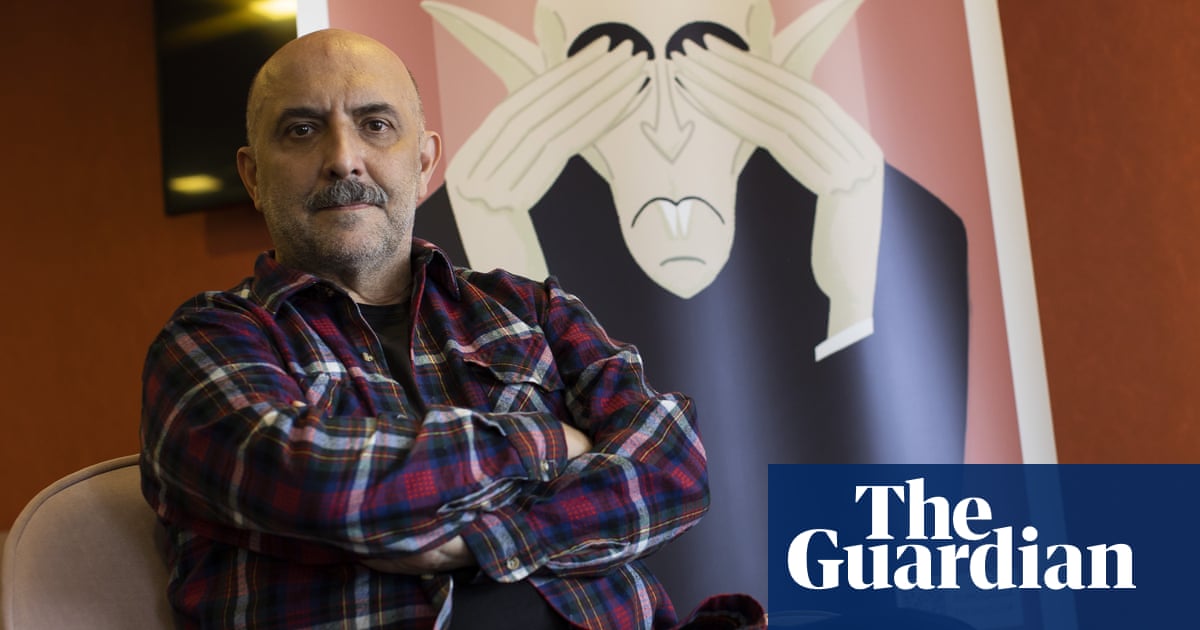
On 29 December 2019, following several days of Christmas indulgence, Gaspar Noé felt an odd sensation in his head. When the ambulance arrived, he was told he’d had a brain haemorrhage; later, the doctors said he had a 50% chance of dying, a 35% chance of surviving with brain lesions, and a 15% chance of escaping unharmed. “I thought: ‘I mustn’t die,’” he says, “‘because it’s not very nice for everyone else to have to sort out all my stuff.’ So maybe my film poster collection saved me: they might have thrown out my Fritz Lang posters, because they don’t know what they’re worth.”
Just over two years later, grinning over a Zoom link (his handle: fritzlang), the Argentinian director, who moved to France at 13, is fully recovered. But he could have had brain damage – something that was still on his mind when, in January last year, he was asked to write a proposal for a project to be filmed in lockdown. It led to a complete departure for the serially offensive bad boy of modern French cinema: his new film Vortex, a sombre and decidedly unprovocative look at dementia and ageing. Even more surprising is that it stars none other than Italian horror maestro Dario Argento. The director responsible for such ultraviolent classics as Suspiria and Deep Red is also on our Zoom call, from his home in Rome.
“It was the good Lord that helped you,” the 81-year-old says of Noé’s haemorrhage.
“Oh, that’s what you reckon!” says Noé, giggling nervously. He’s not a believer, he says: “I hope Dario will set me on the path of light!”

Noé became notorious after 2002’s Irréversible, which attracted much controversy for its which attracted much controversy for anwith its unbroken nine-minute rape scene and an earlier sequence in which someone’s head is bludgeoned to a pulp with a fire extinguisher. In recent years, he has had diminishing returns with such shock tactics: 2015’s Love despite attracting much advance press for its 3D unsimulated sex scenes, wasturned out to bewas a dreary affair, and Climax, 2018’s LSD-spiked dance-off, was mere fleeting, addled fun. But now, at the age of 58, Noé has been jolted into his most focused and mature work. Many are comparing Vortex to Amour, Michael Haneke’s 2012 film about life’s final furlong that was nominated for a best picture Oscar; it also lines up well alongside Anthony Hopkins’ dementia drama The Father, which Noé raves about. “They swap the actors playing the characters, so you have the impression of being inside the mind of someone going mad. The film drives you a bit crazy. Have you seen it, Dario?” (Dario has not.)
In Vortex, Argento plays “Lui” (“Him”), an elderly film critic living in a labyrinthine Parisian apartment with his wife “Elle” (“Her”, played by the veteran French actor Françoise Lebrun), a former psychiatrist in the first stages of Alzheimer’s. It is a claustrophobic, largely unadorned account of her increasing confusion, his struggle to write a book about cinema and dreams, and the recovering drug-addict son who flounders around trying to help them. But Vortex has one Noé conceptual twist: it’s filmed in a befuddling split screen that, as it follows both of them around, sets the separate hemispheres of your brain squabbling.

Noé always had Argento in mind for Lui but the older director wasn’t keen on acting at first. “I didn’t like the idea,” recalls Argento, shrugging testily, a framed poster of Rear Window on the wall behind him. “I’m a director, not an actor. I don’t like being in front of the camera with people telling you what to say.” But Noé buttered him up by comparing the project to Umberto D, Vittorio De Sica’s classic 1952 Italian neorealist drama about an impoverished pensioner, and told him Vortex would be entirely improvised. “That gave me a sort of enthusiasm,” says Argento. “To improvise the film like the neorealist directors, who took people off the street and put them in the film.”
Neorealism seems like a weird jumping-off point for the pair, with their commitment to cinematic excess. They have known each other since 1991, when Noé approached the older director at the Toronto film festival to come to a screening of Carne, the 38-minute film that was a prequel to his shocking full-length debut Seul Contre Tous (I Stand Alone). “I saw something in this kid’s eyes, so I agreed,” says Argento. “And the film was very interesting.”
Argento’s work in giallo, the garish horror-thriller genre of the 70s, has always been a touchpoint – “ultra-ludic, ultra-sensual, ultra-colourful” – for Noé. “When you go to the cinema,” he says, “sometimes it’s like going to the fairground. I don’t know if Dario’s films are ghost trains or rollercoasters or both. But every time a new Dario Argento comes, I want to get on board.”
The pair seem tight: it is hard to steer them as they trade cinematic war stories, the silvery-haired Argento fuller-faced these days than his gothic 70s appearance, while the moustachioed Noé guffaws like an off-duty pirate. In apparently good nick, he has ditched his hedonistic lifestyle, quitting drugs, smoking, spirits and salting his food. During his convalescence, he also stuck to a strict cinematic diet, at least one film a day: “It excites me. Cinema is my drug.” he says.
The film took shape in an “ambience of malady and death”, says Noé, in which he lost three irreplaceable figures in his life: his director wife Lucile Hadžihalilović’s father; Philippe Nahon, the lead actor in Carne and Seul Contre Tous; and his father’s best friend. But it was mainly inspired by his mother Nora who, before she died several years ago, had dementia. His father, the painter Luis Felipe Noé, cared for her just as Argento’s character does: “He was upstanding, exemplary. He was just as loving, even given all the difficulties.”
The presence of an older director on set seems to have galvanised Noé. He was used to doing multiple takes, as many as 12 on Climax. But Argento is a speedier worker. “After the second take, Dario would say: ‘That’s it, we’re done,’” says Noé. “I’d ask for a third, and he’d go: [grumbling] ‘Gaspar!’ So I tried to do it at his rhythm; you’ve got to do it well right from the start.”

Argento’s contribution – creating the details of his character and improvising all the dialogue – went beyond that of most actors, most strikingly in one scene that, in its way, is as horrible as any of the operatic murders he concocted for his own films. Noé tried to help him out by sourcing real-life material of people expiring in agony: “He sent them back, saying: ‘What is this? I know how people die! Get the hell out of here with your stupid videos.’”
Maybe, as an 81-year-old, it was too close to home? But Argento says he does not think about death. “I don’t understand this ‘old age’,” he says, with a glimmer of a smile. “I feel like I did when I made my first film – the same spirit, the same ideas.” (While he was shooting Vortex, he was preparing his 19th film as director: Dark Glasses, another giallo thriller.)
If Argento is synonymous with giallo, Noé has been bracketed with the New French Extremity, the transgressive mob of 90s Gallic directors that also included Leos Carax, Catherine Breillat and Virginie Despentes. The movement is being celebrated this month with a BFI season, but Noé believes the label is basically meaningless: his peers were just a perse group of people with good film taste who took advantage of the liberal-minded French financing system to make the “sulphurous” work they wanted to see. “You can film butts, an erect cock – it’s not going to shock anyone in France. As soon as people see a cock in the UK or the US, they think they’ve seen the devil. It’s impressive how uptight they are.”

But now the one-time provocateur has inadvertently made a film for everyone. After seeing it, people are keen to discuss their experiences of caring for the elderly with him. “There are three types of viewers,” he says. “Those who’ve lived it, those who are living it, or those who are going to.” He was nervous, though, about one viewer’s verdict: his dad’s. “He didn’t say much for a day, then he watched it again. He said: ‘I really like it, but it’s by far the most violent film you’ve made. It describes the toughness of life as it impacts the majority of people.’”
Maybe the secret of living life well is knowing when to quit. Argento insists his late thespian career change is for one night only: “Vortex is the first and last film I’m doing as an actor” he says. As for Noé, the film is a kind of “projection”, given his family history (his maternal grandmother also had dementia) and his own health scare. “I am more predestined to finish in that state than how I am now,” he says, eyes drifting wistfully. But, beyond that, he is calm. Every life, after all, is waiting for the big Fin: “It’s not such a big thing. It’s just the film ending.”
Vortex is released in cinemas on Friday 13 May. The season Cruel Flesh: Films of the New French Extremity runs at BFI Southbank, London, throughout May.



























































